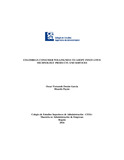Colombian consumer willingness to adopt innovative technology products and services
Fecha
2016Citación
Metadatos
Mostrar el registro completo del ítem
Documentos PDF
Resumen
Este estudio tiene el objetivo de probar la validez de la versión actualizada de la disponibilidad de la tecnología Índice (TRI 2.0; Parasuraman y Colby, 2014) en Colombia y el impacto de los rasgos de personalidad individuales en las cuatro dimensiones del TRI. Para este propósito, una primera hipótesis fue formulada con el fin de probar la previsibilidad de la demografía y la puntuación TRI 2.0 con la intención de adoptar productos y servicios tecnológicos.
Resumen
This study has the goal to test the validity of the updated version of the Technology Readiness
Index (TRI 2.0; Parasuraman and Colby, 2014) in Colombia and the impact of individual
personality traits in the four dimensions of the TRI. For this purpose, a first hypothesis was
formulated in order to test predictability of demographics and the TRI 2.0 score with the intention
to adopt technological products and services. A second hypothesis was described to validate the
existence in Colombia of the five-cluster segmentation scheme proposed in the TRI 2.0 research.
Finally, the third hypothesis seeks to test any kind of correlation between the personality traits and
the TRI 2.0 score of an individual and its impact on the intention of adopting technological
products or services. The survey was answered by 364 people, 338 of which were Colombians, so
26 people were discarded from the analysis, most of the respondents live in Bogota (83,4%) while
the capital only hosts 16,3% of Colombia population. The department/region that follows Bogota
is Santander since it adds up the 6,5% of the sample while it only represents the 4,3% of inhabitants
of the country. The rest of the regions are under-represented when comparing the relative
participation within the sample among the general population of the country. The survey was
conducted in Spanish using a professionally translated version of the updated 16-item TRI 2.0
(Parasuraman & Colby, 2014) and the Ten-Item Personality Inventory (TIPI; Gosling, Rentfrow,
& Swann, 2003).
The findings of this study confirmed the validity of the TRI 2.0 when applied to a Colombian
consumer sample and the significance of attitudinal variables in order to partially predict the
intention to adopt technology innovations. It also partially demonstrated the correlation between
the personality traits of an individual and his/her TRI 2.0 score which implies that certain traits
7
influence the willingness for a consumer to adopt innovative technology products and services.
Finally, when performing a K-mean cluster analysis with the collected data for the current research,
authors found the existence of five meaningful segments in the Colombian Sample Market, the
same segments as Parasuramman and Colby (2015) found in U.S. market, such segments are
“Explorers”, “Pioneers”, “Hesitators”, “Skeptics” and “avoiders”

